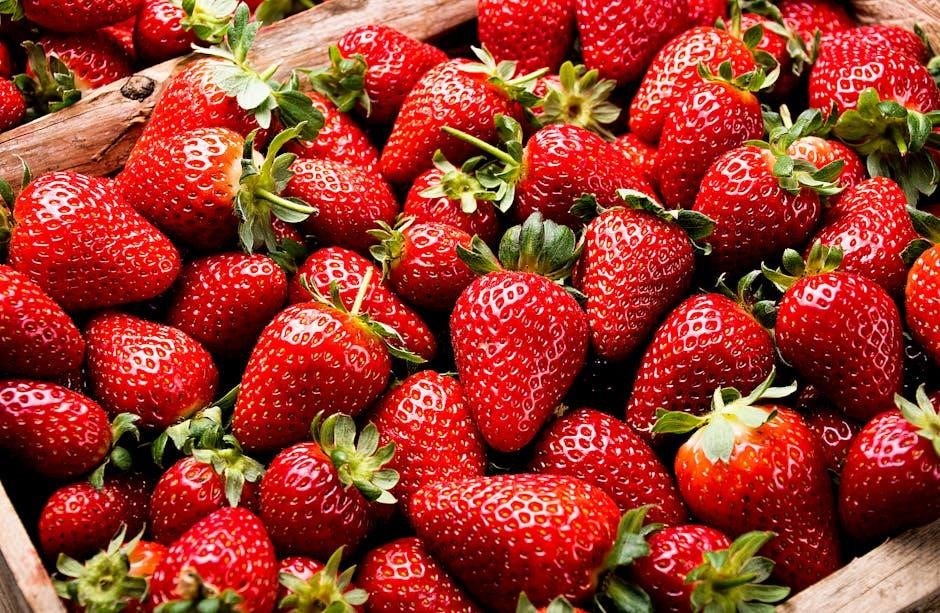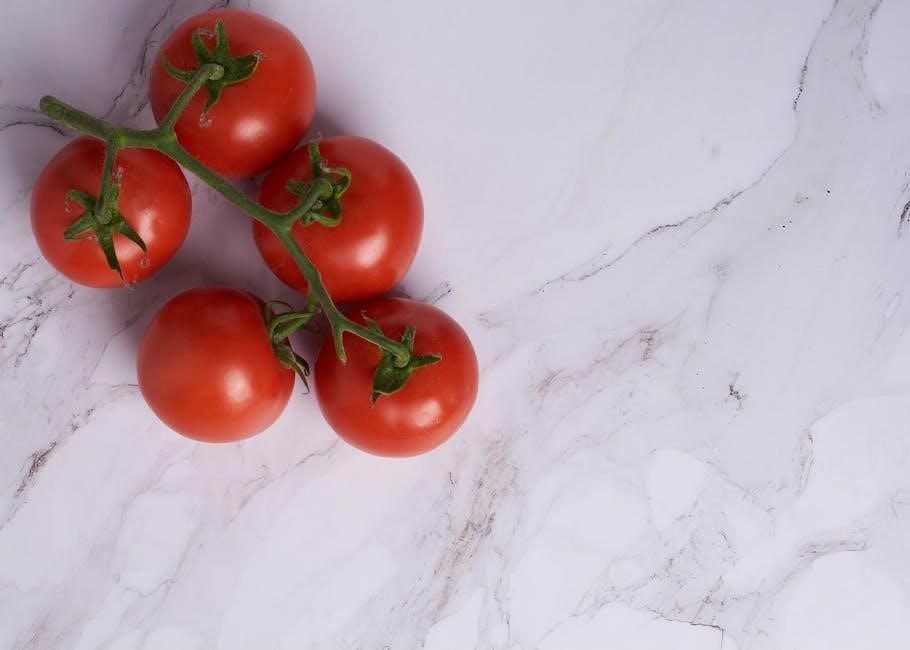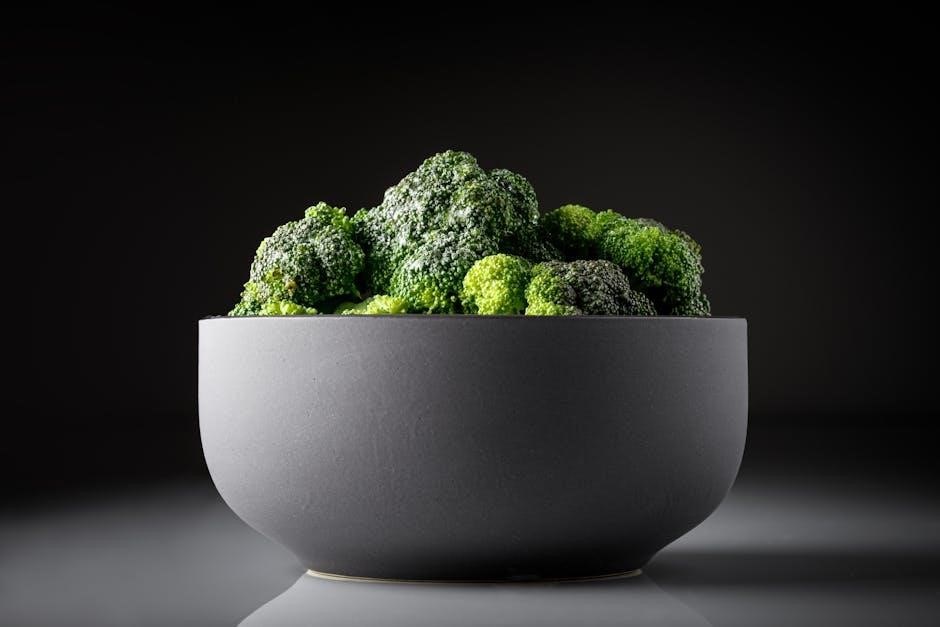anti reflux diet pdf
The anti-reflux diet focuses on managing GERD symptoms by avoiding trigger foods and incorporating lean meats, whole grains, and fiber-rich options to reduce acid reflux and promote healing.
1.1 Understanding Gastroesophageal Reflux Disease (GERD)
GERD is a chronic condition where stomach acid flows back into the esophagus, causing discomfort and inflammation. It occurs when the lower esophageal sphincter (LES) fails to close properly. Symptoms include heartburn, regurgitation, and difficulty swallowing. If left untreated, GERD can lead to complications like esophagitis or narrowing of the esophagus. Factors such as obesity, smoking, and certain foods can worsen symptoms. Managing GERD often involves lifestyle changes and dietary adjustments to reduce acid reflux and alleviate discomfort.
1.2 The Role of Diet in Managing GERD Symptoms
Diet plays a crucial role in managing GERD symptoms by reducing acid reflux and preventing esophageal irritation. Certain foods can trigger reflux by relaxing the lower esophageal sphincter or increasing stomach acid production. A tailored diet focuses on avoiding trigger foods while incorporating lean meats, whole grains, and fiber-rich options to promote healing. Additionally, portion control and eating habits, such as avoiding late-night meals, can significantly reduce symptom severity. By making dietary adjustments, individuals can alleviate discomfort, prevent complications, and enhance overall quality of life while managing GERD effectively.
Foods to Include in an Anti-Reflux Diet
Incorporate lean meats, whole grains, fruits, vegetables, and low-fat dairy to reduce inflammation and improve digestion, aiding in managing GERD symptoms effectively.
2.1 Lean Meats and Fish
Lean meats like chicken, turkey, and fish are excellent choices for an anti-reflux diet. They are low in fat and easy to digest, reducing the risk of heartburn. Avoid processed or fatty cuts of meat, as they can trigger acid production. Opt for baking, grilling, or steaming instead of frying. Fatty fish, such as salmon, also provide omega-3 fatty acids, which can help reduce inflammation. Incorporating these proteins into meals helps maintain a balanced diet while minimizing GERD symptoms. They are versatile and can be prepared in ways that suit various tastes and preferences, making them a great addition to anti-reflux meal plans.
2.2 Whole Grains and Fiber-Rich Foods
Whole grains and fiber-rich foods are essential in an anti-reflux diet as they help improve digestion and reduce symptoms. Oats, quinoa, brown rice, and barley are excellent choices, providing sustained energy and preventing acid reflux. High-fiber options like whole-grain bread, cereals, and legumes also support gut health. These foods are naturally low in fat and acids, making them gentle on the esophagus. Incorporating them into meals helps maintain a balanced diet and promotes overall well-being. They are also versatile and can be prepared in various ways to suit different tastes and preferences while supporting GERD management.
2.3 Fresh Fruits and Vegetables
Fresh fruits and vegetables are highly recommended in an anti-reflux diet due to their low acidity and high nutrient content. Non-citrus fruits like apples, bananas, and melons are ideal, as they are less likely to trigger acid reflux. Leafy greens, carrots, and cucumbers are also excellent choices, promoting healthy digestion and reducing esophageal irritation. These foods are naturally alkaline, helping to balance stomach acid and alleviate symptoms. Incorporating a variety of colorful fruits and vegetables ensures a nutrient-rich diet while supporting overall gastrointestinal health and well-being.
2.4 Low-Fat Dairy Products
Low-fat dairy products, such as skim milk, yogurt, and cheese, are beneficial in an anti-reflux diet. They are less likely to trigger acid reflux compared to high-fat versions. These foods can help neutralize stomach acid and provide essential nutrients like calcium and protein. Opting for non-fat or reduced-fat options minimizes symptoms and supports overall digestive health. Incorporating these into meals can aid in managing GERD while maintaining a balanced diet. Always choose products with minimal added sugars and avoid high-fat or processed dairy to maximize their anti-reflux benefits.

Foods to Avoid
Certain foods can trigger acid reflux by relaxing the lower esophageal sphincter or irritating the esophagus. Avoid fried, high-fat, spicy, and acidic foods to reduce symptoms.
3.1 Fried and High-Fat Foods
Fried and high-fat foods can delay digestion and relax the lower esophageal sphincter, leading to acid reflux. They include items like french fries, fried chicken, doughnuts, and creamy sauces. These foods are typically high in saturated fats, which slow gastric emptying and increase pressure on the stomach. Avoiding these can significantly reduce GERD symptoms. Opt for baked or grilled alternatives to minimize fat intake and promote better digestion. Incorporating healthier cooking methods can help manage acid reflux more effectively without compromising on taste.
3.2 Citrus Juices and Acidic Beverages
Citrus juices, such as orange, grapefruit, and tomato juice, are highly acidic and can irritate the esophagus, worsening GERD symptoms. Similarly, acidic beverages like soda and sports drinks can trigger reflux. These liquids lower the pH of the stomach, increasing acid production and discomfort. To manage symptoms, it’s best to avoid these drinks or dilute them with water. Opt for non-acidic options like herbal teas, water, or almond milk instead. Reducing acidic beverage intake can significantly alleviate heartburn and promote a healthier digestive system.
3.3 Carbonated Drinks and Alcohol
Carbonated drinks, such as sodas and sparkling water, can trigger acid reflux by causing bloating and gas, which increases pressure on the lower esophageal sphincter. Alcohol, particularly spirits, wine, and beer, can relax the sphincter, allowing stomach acid to flow upward. Both beverages can worsen GERD symptoms like heartburn and discomfort; Reducing or eliminating carbonated drinks and alcohol from your diet can significantly reduce reflux episodes. Opting for still water, herbal teas, or non-acidic juices is a healthier alternative to manage symptoms effectively and protect the esophagus from irritation.
3;4 Spicy and Trigger Foods
Spicy foods, such as chili peppers, hot sauces, and wasabi, can irritate the esophagus and worsen GERD symptoms. Additionally, trigger foods like tomatoes, tomato-based products, and chocolate can relax the lower esophageal sphincter or increase stomach acid production. These foods often cause discomfort and heartburn in individuals with GERD; Avoiding spicy and trigger foods is essential for managing symptoms effectively. Instead, opt for milder seasonings and non-acidic alternatives to reduce irritation and promote healing. Identifying and eliminating personal trigger foods can significantly improve quality of life and reduce acid reflux episodes.

Meal Planning and Portion Control
Plan balanced meals, avoid trigger foods, and control portion sizes to manage GERD. Eating smaller, frequent meals and creating a structured eating schedule can help reduce symptoms.
4.1 Sample Meal Ideas for GERD Management
Breakfast: Oatmeal with sliced banana, a drizzle of honey, and a sprinkle of cinnamon. Add a side of poached eggs for protein.
Lunch: Grilled chicken breast with quinoa and steamed vegetables like spinach or carrots. Include a small side of fresh berries for dessert.
Dinner: Baked cod with brown rice and roasted asparagus. Avoid heavy sauces and opt for light seasoning with herbs like parsley or basil.
Snacks: Sliced cucumbers or bell peppers with a small portion of low-fat yogurt. Stay hydrated with water or herbal teas between meals.
These meals emphasize lean proteins, whole grains, and low-acid vegetables, helping to manage GERD symptoms effectively while promoting proper digestion.
4.2 The Importance of Smaller, Frequent Meals
Eating smaller, frequent meals throughout the day can significantly reduce GERD symptoms. This approach avoids overloading the stomach, which can trigger acid reflux. By dividing meals into 4-6 smaller portions, you reduce pressure on the lower esophageal sphincter, minimizing the likelihood of acid backup. Additionally, smaller meals promote better digestion and prevent post-meal discomfort. Opt for balanced snacks like nuts, low-fat yogurt, or fresh vegetables between meals to maintain steady energy levels without overburdening the digestive system. This strategy is particularly effective for managing symptoms and improving overall digestive health.

Lifestyle Modifications
Lifestyle changes play a crucial role in managing GERD symptoms. Maintaining a healthy weight, avoiding late-night eating, and quitting smoking and alcohol can significantly reduce reflux episodes and improve overall well-being.
5.1 Weight Management and Its Impact on GERD
Excess weight can exacerbate GERD by increasing intra-abdominal pressure, which pushes stomach contents into the esophagus. Maintaining a healthy weight through a balanced diet and regular exercise helps alleviate symptoms. Even a modest weight loss can significantly reduce reflux episodes and improve overall health. Incorporating physical activity, such as walking or yoga, strengthens core muscles and enhances digestion. Combining weight management with dietary changes creates a comprehensive approach to managing GERD effectively and preventing long-term complications.
5.2 Avoiding Late-Night Eating and Poor Eating Habits
Late-night eating and poor eating habits can worsen GERD symptoms by delaying digestion and increasing stomach pressure. Lying down after meals can cause gastric acid to flow more easily into the esophagus. To avoid this, finish eating at least 2-3 hours before bedtime and opt for lighter, balanced meals in the evening. Avoid heavy, greasy, or trigger foods that can slow digestion. Additionally, eating smaller portions and avoiding distractions during meals can improve digestion and reduce reflux episodes, promoting better overall health and symptom management.
5.3 Smoking and Alcohol Cessation
Smoking and alcohol consumption significantly worsen GERD symptoms by relaxing the lower esophageal sphincter, allowing stomach acid to flow back into the esophagus. Smoking weakens the sphincter’s function and reduces saliva production, which naturally neutralizes acid. Alcohol, particularly in large amounts, can irritate the esophagus and trigger reflux episodes. Quitting smoking and reducing or eliminating alcohol intake can greatly reduce symptoms and improve overall digestion. cessation also lowers the risk of complications like esophageal damage. Professional guidance and support are often necessary for successful smoking and alcohol cessation, making it an important step in managing GERD effectively.

Natural Remedies and Supplements
Natural remedies and supplements, such as herbal teas, probiotics, and psyllium husk, can help alleviate GERD symptoms by promoting digestion and reducing acid reflux naturally.
6.1 Herbal Remedies for Acid Reflux
Herbal remedies like ginger, aloe vera, and chamomile tea may help soothe the esophagus and reduce inflammation. Ginger has natural anti-inflammatory properties that can aid digestion and alleviate heartburn symptoms. Aloe vera juice, when consumed in small amounts, can help calm irritation in the esophageal lining. Chamomile tea, known for its soothing effects, can relax the muscles and reduce acid reflux discomfort. These natural options are often used alongside dietary changes to manage GERD symptoms effectively without harsh side effects. Always consult a healthcare provider before starting new remedies.
6.2 The Role of Probiotics and Psyllium Husk
Probiotics and psyllium husk are natural supplements that can support digestive health and reduce acid reflux symptoms. Probiotics, found in fermented foods like yogurt or taken as supplements, promote a balanced gut microbiome, which can improve digestion and reduce inflammation. Psyllium husk, a soluble fiber, absorbs water in the stomach, forming a protective gel-like barrier that soothes the esophagus and prevents acid from rising. Both options are gentle on the system and can complement dietary changes, offering a natural way to manage GERD without the side effects of medications. Always consult a healthcare provider before adding new supplements to your regimen.
